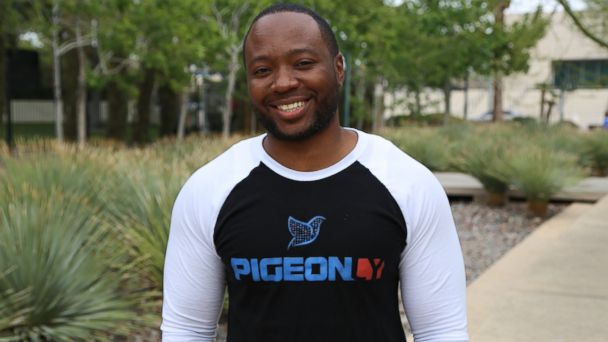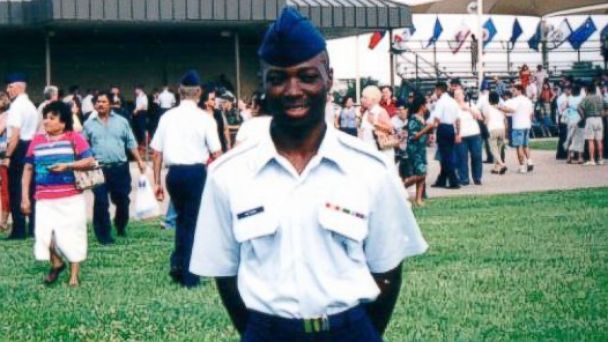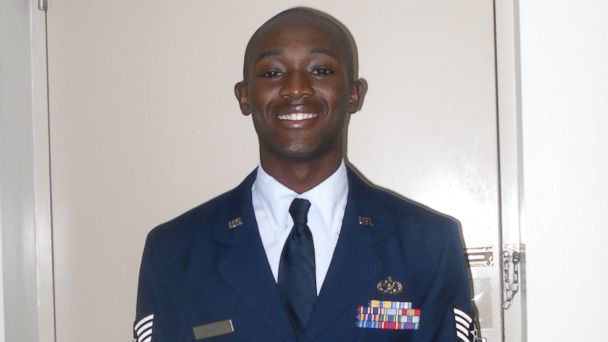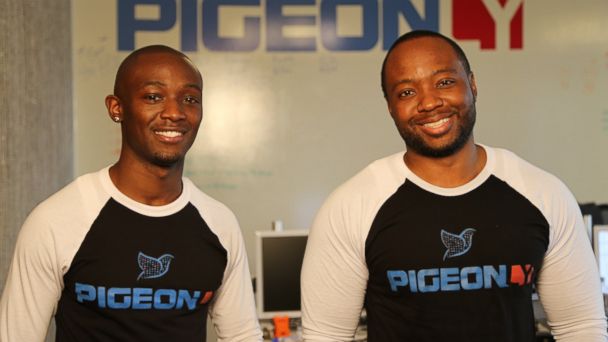US Air Force Vet Goes From Inmate to Entrepreneur

Pigeonly CEO and Founder Frederick Hutson in Downtown Las Vegas. Angel Canales/ABC News
Las Vegas - Frederick Hutson always wanted to be a businessman.
"I always knew I'll be doing something entrepreneurial," he said.
After graduating from high school, Hutson followed in his uncle's footsteps and joined the U.S. Air Force.
"My uncle retired from the Air Force and he was always in my ear talking to me about it. He was the most successful person in our family and someone I looked up to and when I saw his success, for me, it was a no brainer to join," he said.
Hutson became an F-16 Avionics Electrician and served honorably for almost three years. He had an entrepreneurial spirit. At age 19, he launched and later sold a window tinting business. Two years later, he opened a cell phone store, and again, turned a profit.

Frederick Hutson at his U.S. Air Force military boot camp graduation. Frederick Hutson
Hutson, 30, always saw a need to fix problems - but following a brush with the law - his entrepreneurial ideas were put on hold. He joined his friend's marihuana trafficking business and was caught. The risky business decision landed Hutson, a man with no previous criminal record in federal court in 2008. He served four years behind bars for trafficking marijuana.
"It is probably one of the most disruptive experiences ever," he recalled. "You go from having control over what time you get up, what time you eat, when you sleep, where you sleep, who you sleep next to and not having control of anything."
During his time in prison, Hutson was moved to about eight federal prisons.
"It was very difficult and expensive to stay connected [with family and friends] during that time. Even though you have family members that love you and care for you it is very hard for people to live in a digital world to stay connected with someone who lives completely in the analog world. It is easier to send a text message, an email but is very difficult to write a hand letter and print photos and head to the post office to mail it," he said.
That's when he thought of a solution to make it easier for inmates and their families to communicate and stay in contact. He reached out to his friend and former U.S. Air Force veteran Alfonzo Brooks while he was in a halfway house.
"I had a few ideas prior to leaving prison. I knew exactly what I wanted to build and I reached out to Alfonzo my co-founder and I told him about my idea. I knew what I wanted to accomplish but I had no idea where it was going to take me," he said.

U.S. Air Force veteran Alfonzo Brooks. Alfonzo Brooks
Brooks and Hutson met in 2004 in the Air Force. Brooks always kept in touch with him but when Brooks tried to reach Hutson in prison, it took him two month to make contact with him.
"I didn't know where he was located so I knew that his idea could be something really important. Even if it is just to locate inmates," said Brooks.
Hutson's last letter to Brooks before leaving prison was about launching the business venture.
Huston's idea paid off. In March 2012, he launched Pigeonly, a platform that collects data and identifies the incarcerated - allowing family and friends to contact inmates in prison. The company has two products, Fotopigeon, a photo-sharing service that prints photos uploaded from a cell phone, computer or tablet and then ships them anywhere in the world. The other, Telepigeon, is a calling service for prison inmates that makes it more affordable for families to talk to loved ones by providing them with a local number.

Frederick Hutson (right) and Alfonzo Brooks (left) at Pigeonly''s headquarters in Downtown Las Vegas. Angel Canales/ABC News
"When it is a pain point that you lived for a long time you have an intimate understanding of what problem you're trying to solve, who you're trying to solve it for and you can put together solutions that actually work," said Hutson.
Only when the company had a few thousand customers, they knew that the investor community would take them seriously. They went to San Francisco and applied to a technology accelerator program called NewMe, which helped them redefine their business model and secure $1 million in seed money for financing.
Being able to provide a platform for inmates and their family members to stay in contact is important for Hutson.
"While I was in prison, I noticed there was a huge population of people that no one was paying attention. We have people that haven't seen their kids in years, haven't seen their mother in years and then they use our service and can receive photos and make those important phone calls," he said.
Today, Hutson's company employs 10 people in Las Vegas.
"I started a business before but I never done anything with technology or software engineering or building websites. It gives me a lot of satisfaction that every day we are solving pain points with people," he said.
Second Tour is an ABC News digital series profiling the lives of military veterans who are doing unique things in the civilian world. For more stories, click here.
ABC News video editor Arthur Niemynski contributed to this report.